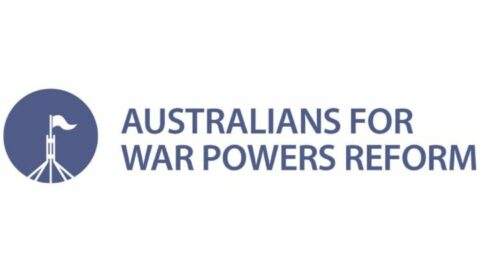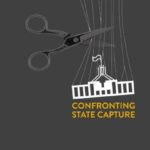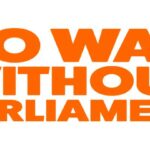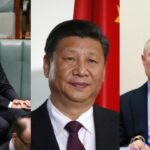Greater Transparency in Defence Decision-Making: Interview With AWPR’s Dr Alison Broinowski

Current PM Scott Morrison dropped it on the nation last September that Australia had become a part of the AUKUS pact, with the US and the UK, and, as part of this China-focused defence alliance, our nation would be acquiring nuclear-powered submarines.
Whilst Australians are used to the executive dropping significant decisions upon us, this one was a doozy.
Not only are we heading up the AUKUS acronym that basically means “allies in war against China” without any consultation, but we’re also going nuclear, no questions asked.
And it’s these decisions and a mounting number of others like them over the last twelve months, that have prompted Australians for War Powers Reform (AWPR) to call for greater accountability and transparency around foreign affairs and defence decision-making processes post-election.
Released on 8 May, AWPR’s Defence and Diplomacy – Priorities for the Next Federal Government statement suggests that the incoming government broadens the defence decision-making process, so that it involves the entire parliament, and hence engages the general public as well.
Democratising defence
“Defence and foreign affairs issues are regularly and deliberately quarantined within the purview of a small, elite group of ministers and the military establishment,” AWPR makes clear in its statement.
“This lack of democratic oversight appears to be predicated on the condescending notion that national security is too important to be opened up for discussion by the Australian community.”
According to the organisation, this situation has led to the nation making a series of poorly thought out and expensive defence equipment purchases over the last two decades, with the AUKUS submarines being the last in a long list of misguided acquisitions.
AWPR makes six broad recommendations for the incoming government, which include shifting “from lethal force coalitions to focus on international cooperation”, parliamentary decision-making on war and the holding of an independent inquiry into all wars we’ve participated in since 2000.
The organisation further wants “far greater transparency and accountability for all decisions concerning defence, foreign affairs and national security”, and commitment to parliamentary involvement in major defence decisions.
Finally, AWPR wants the Parliamentary Joint Committee on Intelligence and Security (PJCIS) to be overhauled so that its members include non-major party MPs and senators.
War powers reform
Established in 2012, AWPR is an ongoing campaign to see reform around the decision-making process on whether Australia joins an overseas conflict. Commonly referred to as war powers, this decision-making process should be made by parliament, AWPR asserts, rather than a few ministers.
The National Security Committee makes the decision on whether our nation joins military action overseas. Right now, this body is made up of Scott Morrison, Barnaby Joyce, Josh Frydenberg, Marise Payne, Peter Dutton, Simon Birmingham, Karen Andrews and Michaelia Cash.
Sydney Criminal Lawyers spoke to AWPR president Dr Alison Broinowski about the way the government delivered AUKUS, how Australian defence decisions are based on cherry-picked US intelligence and why Whitlam’s dismissal continues to affect defence decision-making to this day.

PM Scott Morrison all of a sudden announced that Australia had joined the AUKUS defence pact last September. Anda key part of this agreement involves our nation acquiring nuclear-powered submarines.
A lot of Australians were shocked to find that our government could simply inform us of such dramatic decisions without any public consultation or even prior warning.
Dr Broinowski, while the executive making such decisions is the regular political process, can you speak on why this mightn’t be an optimal situation?
It’s an appalling way for this to happen. It takes me back to the days, when we wouldn’t have even countenanced having anything approaching a nuclear-powered submarine or any other kind of ship coming and going from Australian waters.
It’s a truly sad sign of how we’ve regressed in recent years.
But, thinking about how we, the Australian people, will pay for this – and it’s mega billions of dollars – this debt we’re incurring as a nation, will not be paid by us or by our politicians, but it will be paid by our grandchildren.
This is something that we, as ordinary Australians, might not wish to leave to our grandchildren. We don’t even know how much that debt will be, as they’re not telling us.
Over and above that though, there’s no accountability to how this money is being spent. But we do ask about how we account for a local council building a bypass road or spending our money on something like a new airport – anything like that. But there’s no accounting on this.
What we appear to be doing is buying whatever the United States tells the prime minister we need. So, it’s no wonder they all looked so pleased when we agreed to it, because they got all the money, and we get to pay for it.
There’s absolutely nothing in the way of accountability for this. And yet, there’s only a convention and a public expectation that stands between us and this happening at any time.
The government is apparently able to do it and they’re doing it.
In response to this defence decision-making process and the rising impact it’s having in the current political climate, AWPR released its Defence and Diplomacy statement last week.
Broadly speaking, what sort of reforms is your organisation recommending the next government makes in terms of defence?
The lack of accountability and responsibility from the elected government, is the same in terms of how defence is operating, and more specifically, on war.
We want much more openness and public consultation. We want members and senators to be accountable to the electorate.
That would mean if they took us to an unsuccessful war, as has happened before, it would be the responsibility of the politicians who put them there.
More directly, the accountability we want from our elected representatives would be expressed by means of a debate and a vote in parliament before the troops are sent to war.
This doesn’t happen now, and we want this to be an issue. And not just when war is imminent and it’s already too late. We want it when wars are being planned, discussed and prepared for.
We want this, and most Australians agree that politicians owe this to us.
You’ve just touched on scenarios where wars are being contemplated.
The Quad is another alliance that formed some years ago but has recently taken on an increasing significance. Along with AUKUS, the Quad also has China’s presence in the Indo Pacific region as its primary focus.
The AWPR statement asserts that neither major parties conduct thorough security analyses, which leaves the potential for concocted threats and an overreliance on US security intelligence.
Can you elaborate on the implications of these arrangements and the risks they pose?
Certainly, in its first iteration, the Quad was and now still is an American initiative, despite what they say about it originating from here. First of all, it was approved by John Howard, and then by Scott Morrison.
The first one failed for lack of support, in particular, in the interests of Australia and Japan. And now, the latest one, with changes of government in several countries, including India, they’ve put it together again.
Although its purpose is still the same. It was dressed up with a few humanitarian objectives, but its real purpose is to encircle and contain China.
Now, China’s rise is perfectly justifiable, and they’re entitled to it. They’ve achieved an amazing result in a relatively short number of decades.
Until 2018, the Morrison government actually welcomed this because it was of great benefit to Australia.
Then, when US policy suddenly changed towards China and China’s behaviour became more assertive, the Quad became something that they wanted. And Australia and Japan both now have leaders that largely support it.
Australia, and in fact, all countries in the Quad, are provoking China through the alliance and through the various other statements that we make.
Apparently, we made this decision to favour the United States, but also, the government made it to wedge the opposition and make it look weak on defence. If they oppose the Quad, they can be accused of having no backbone against China.
As far as intelligence is concerned, Australia depends very heavily on the Five Eyes sharing arrangement for its intelligence. But let’s remember that it’s dominated by US intelligence, and the US, in effect, decides on who our enemies are and what threats we face.
The intelligence is still being built around that, as it was at the time of the Iraq War. Remember, we went into Iraq in 2003, on a claim from American intelligence that Saddam Hussain had weapons of mass destruction, which he did not.
So much for American intelligence.
Our sudden anti-China policy from 2018 is built on the same sort of intelligence that the Americans cherry-pick for the benefit of their allies in order to keep them onside. That’s what happens every time.
Since Dutton took over the defence portfolio in March last year, he’s been gung-ho on war with China, and there’s been an increasing focus on military expenditure. However, Labor isn’t showing any signs of opposing any of this.
Indeed, when the Solomons situation boiled over, Penny Wong’s statements about Morrison’s miscalculations seemed to imply that the opposition is taking the same line on China.
Do you think a change in government is likely to see a dramatic difference in the approach currently being taken to China?
We have bipartisanship on foreign and defence policy these days. We’ve had it for a long time on immigration.
But now, it seems to have migrated to both foreign and defence policy. And bipartisanship is what Labor has signed up for and is putting into practice.
I listened to Penny Wong and Marise Payne the other day, and apart from a difference between them on climate policy, and, to a certain extent, on the Solomons and how we’re handling it, there was very little to choose between them.
Penny Wong has made some very good statements about the national interest. But, in fact, Australian foreign and defence policy cannot be expected to change in any significant respect.
Let’s remember that the reason for this is Kim Beazley. When he was leading the opposition, he got wedged on the children overboard and the Tampa event. And he said he’d never have another bad day like that in the Murdoch Press.
So, he went bipartisan from that time, and no subsequent Labor government has moved greatly away from that position in spite of what Penny Wong says, and in spite of some of Kevin Rudd’s statements.
Even further, we should remember that no Australian government has defied the United States on foreign and defence policy since 1975. And every politician who remembers that knows exactly what can happen to a government that does that.
Currently, the decision to send Australian troops into foreign conflicts is made by the war cabinet, which consists of the prime minister and seven other senior ministers.
AWPR’s main focus is campaigning for this to be a decision made by the entire parliament, so that all MPs and senators, as well as their constituents, have input into whether we go to war.
How would you say your new proposal to overhaul national security decision-making processes ties into the broader campaign?
The two things are the same really. Reform of the war powers is a more specific reform of national decision-making generally.
As I said a moment ago, neither the government nor the opposition want the way that these decisions are made to be scrutinised by the whole of parliament.
They’re happy to keep the power in as few hands as possible because it makes life easier for them.
The National Security Committee of Cabinet is where these decisions, particularly for war, are made.
And the very few people in the committee owe their positions to the prime minister and a few public servants, who are present, and similarly, owe their jobs to the prime minister of the day.
This used not to be the way it was in the public service, but now it is. The whole system has been completely politicised, and to get any government or any opposition to change it, is a very big ask, as we’re finding.
And lastly, the AWPR pre-election statement recognises that there’s an increasingly hostile political climate worldwide, which has links to global heating.
The Morrison government is notably increasing its war rhetoric. Labor is not putting forth any differing path in terms of defence, although it has made a commitment to an inquiry into war powers reform.
But, right now, a lot of the constituency is looking beyond the majors to see that something is done about what many consider the real national security threat to be, which is the climate crisis.
Dr Broinowski, from the AWPR point of view, what sort of election outcome is likely to lead to greater defence transparency?
AWPR is a nonpartisan association. It always has been. Our members come from all sectors of public opinion. Some support particular parties. Some support none. And so, we don’t follow any partisan line.
We are encouraged, or we have been in recent months, for the call for more transparency and accountability from some sitting independent members and some of the new independent candidates.
We have been very interested in their views. We have approached all of them. We’ve got support from several of them, which is very encouraging for us.
Some of them have said that they want to think about it further, but they don’t have closed minds. And so, we realise that they are more in touch with their electorates than some of the members of the major parties are.
When we’re talking to them, we point to the connection between making politicians more accountable to their electorates, generally and specifically, in dealing with global heating and for how we go to war.
It’s all a matter of accountability and all of these three things are related to each other. So, that’s why we have added those issues to our current pre-election statement.








